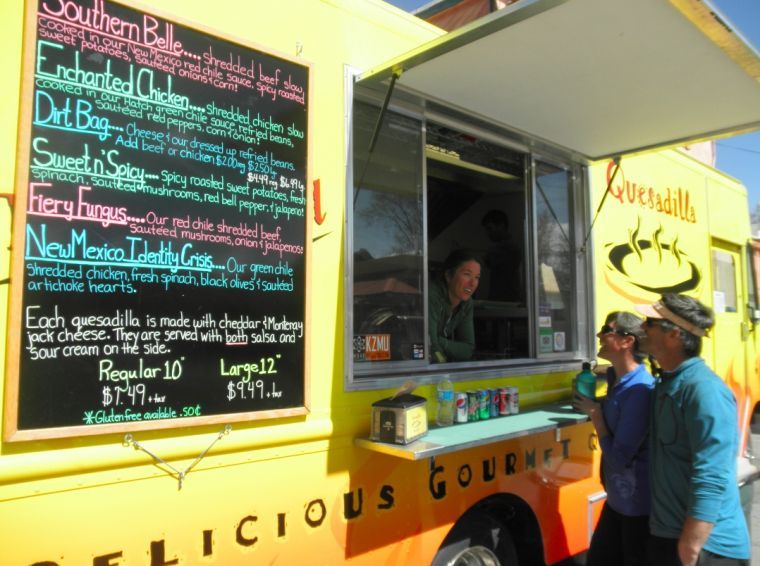Some information may be outdated.
The Quesadilla Mobilla and other mobile vendors in Moab may soon have a new set of rules governing their operation and permitting.
The City of Moab is currently working on new regulations that will make both the regulations and application process for mobile businesses more clear and streamlined, said Jeff Reinhart, the city’s planning director.
“We are in a rough draft stage with this right now,” he said.
A committee has been examining the current regulations and working on improvements for the last two years. They hope to finalize their recommendations and have a draft ready for the city council to vote on within the next two months.
Food trucks and other mobile businesses have been in Moab to varying degrees for years, particularly during large events. However, the rules covering the operation of such businesses are in need of being comprehensively defined and laid out by the city, said Donna Metzler, Moab’s city manager.
“We have heard from business owners who have existing licenses that our laws are too cumbersome and that they need to be more flexible to allow for longer permit duration,” Metzler said.
The current duration for a mobile vendor permit in Moab is seven months per year; far too short a time said Carrie Finn, the co-owner of the Quesadilla Mobilla.
Finn believes that the seven month limit, which forced her and co-owner Steve Lucarelli to close their food truck in the middle of October last year, is a serious and unnecessary impediment to their business.
“(We are in) a tough position because we have a very successful business, then we had to close down in peak tourist season,” Finn said.
Finn and Lucarelli want their business to be a permanent part of Moab’s Main Street dining landscape, but there is currently no institutional framework in place to allow that to happen, she said.
Moab usually receives around six to eight mobile vendor applications each year. The applicants can range from long-term businesses, such as the Quesadilla Mobilla, to an ice cream truck that will be in town for a few months, to someone who wants to set up a table to sell merchandise on Main Street.
The applicant first comes to an arrangement with the owner of the property where they will be situated and then submits their application to the city. After the relevant departments have reviewed the application the city council votes on whether or not to approve it. Permits for mobile vendors working at specific events are considered to be under the umbrella of that event, Reinhart said.
In drafting the new rules the city hopes to cover the entire gamut of possible mobile vendors and create clear definitions and rules for each category. The new rules would also systematize the application process, allowing for permits to be issued by the city without the city council needing to vote on each individual application.
Making sure that the vendors provide for infrastructure such as restrooms, trashcans, and recycling bins is also a major focus. The city wants to ensure that tax dollars and other businesses would not being paying for amenities that would be used disproportionately by a mobile vendor.
In their research, the city has looked at similar communities and their regulations regarding mobile vendors. The committee’s recommendations, however, will not be drawing too heavily from those communities.
“What happens when you base your code on another community is you end up with that community’s problems,” Metzler said. “What we try to do is identify the specific issues that we are concerned in addressing.”
“It is very complex and that’s part of the issue. A jigsaw puzzle may be the best example,” Reinhart said.
Not everyone is in favor of making greater accommodations for mobile vendors. Several business owners have expressed concern to the city council that the lower tax burden and overhead cost of mobile vendors is unfair, Metzler said.
“What if someone comes along and sets up a stand selling Moab t-shirts outside a t-shirt shop? What’s to stop a taco stand from opening in front of a Mexican restaurant?” asked Howard Trenholme, the owner of Red Rock Bakery and Net Café. “(Brick and mortar businesses) put a lot of time and effort in. They are making a real commitment to Moab. They won’t be gone when it gets slow on Monday and Tuesday. They’re creating jobs.”
However, many businesses and residents seem to support the idea of more mobile vendors and greater flexibility in their regulation. And Moab’s officials believe that the new rules should reflect that.
“When you have vendors (on the street) it gives a higher level of energy to a downtown street. People tend to stay in those areas for longer,” Reinhart said. “Just having visitors out on the street is a great thing.”
That sentiment is echoed by Robert Daye. Daye owns the Canyonlands Trading Post and the parking lot that the Quesadilla Mobilla is located on. He has found that the food truck is great for business.
“It absolutely brings people in. The more the merrier,” he said.
Appreciate the coverage? Help keep local news alive.
Chip in to support the Moab Sun News.





